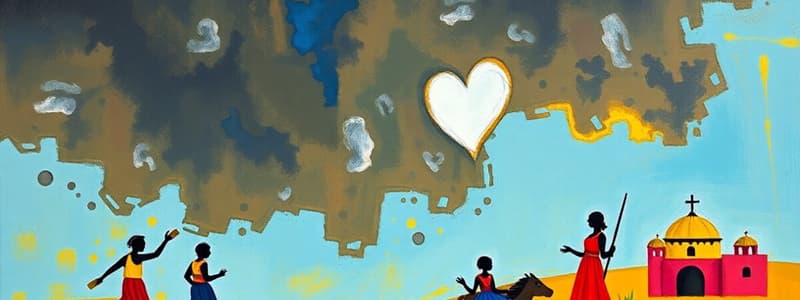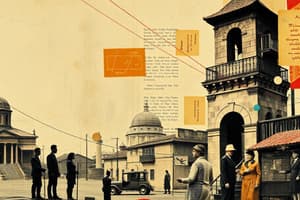Podcast
Questions and Answers
What was the primary spiritual belief practiced by many ethnolinguistic groups during the Pre-Colonial Period?
What was the primary spiritual belief practiced by many ethnolinguistic groups during the Pre-Colonial Period?
- Hinduism
- Catholicism
- Animism (correct)
- Buddhism
What system did the Spanish implement to allocate land and labor during their colonization?
What system did the Spanish implement to allocate land and labor during their colonization?
- Manorial system
- Alcade system
- Feudalism
- Encomienda (correct)
Which event directly resulted in the United States acquiring the Philippines?
Which event directly resulted in the United States acquiring the Philippines?
- Spanish-American War
- Treaty of Paris (correct)
- Philippine-American War
- Battle of Manila
Who was the first President of the Philippines after gaining full sovereignty in 1946?
Who was the first President of the Philippines after gaining full sovereignty in 1946?
What characterized the martial law era declared by Ferdinand Marcos from 1972 to 1981?
What characterized the martial law era declared by Ferdinand Marcos from 1972 to 1981?
Which revolution led to the ousting of Ferdinand Marcos and the restoration of democracy in the Philippines?
Which revolution led to the ousting of Ferdinand Marcos and the restoration of democracy in the Philippines?
What method of instruction was introduced in Philippine schools during the American colonization?
What method of instruction was introduced in Philippine schools during the American colonization?
Which event did NOT occur during the Spanish colonization of the Philippines?
Which event did NOT occur during the Spanish colonization of the Philippines?
Flashcards are hidden until you start studying
Study Notes
Pre-Colonial Period
-
Society and Culture:
- Various ethnolinguistic groups with distinct languages, cultures, and practices.
- Societal structure based on barangays led by chieftains (datu).
- Trade networks with neighboring countries like China, India, and Malaysia.
-
Spirituality:
- Animism practiced by many groups; belief in spirits and nature deities.
- Influence of Hinduism and Buddhism in certain areas.
Spanish Colonization (1565-1898)
-
Arrival of Spaniards:
- Miguel López de Legazpi established the first permanent Spanish settlement in Cebu (1565).
- Introduction of Christianity, particularly Catholicism, as a major religion.
-
Governance:
- The archipelago divided into provinces under Spanish rule.
- Implementation of the encomienda system which granted land and labor to Spanish encomenderos.
-
Resistance:
- Numerous revolts against Spanish rule (e.g., the Dagohoy Rebellion, 1744-1829).
- Emergence of nationalist sentiments in the 19th century.
American Colonization (1898-1946)
-
Spanish-American War:
- Resulting from tensions over Philippine independence, leading to Spanish defeat.
- Treaty of Paris (1898): Spain ceded the Philippines to the U.S. for $20 million.
-
Philippine-American War:
- Filipinos fought for independence from 1899 to 1902; marked by guerilla warfare.
- Harsh counterinsurgency tactics by U.S. forces.
-
Governance:
- Establishment of the Philippine Commission and later, a more autonomous Philippine Assembly.
- Introduction of English as the medium of instruction in schools.
Post-War Period and Independence (1946)
-
World War II Impact:
- Japanese occupation (1942-1945); liberation in 1945 led to significant destruction.
- Filipino guerrilla movements played a crucial role in resistance against Japanese forces.
-
Independence:
- The Philippines gained full sovereignty on July 4, 1946.
- Manuel Roxas became the first President of the independent Republic.
Contemporary History
-
Martial Law Era (1972-1981):
- Declared by President Ferdinand Marcos; characterized by human rights abuses and suppression of dissent.
- Economic challenges and political unrest fueled opposition movements.
-
People Power Revolution (1986):
- Peaceful uprising led to the ousting of Marcos and restoration of democracy.
- Corazon Aquino became the first female President.
-
Recent Developments:
- Ongoing issues include political corruption, economic disparities, and calls for federalism.
- Natural disasters have prompted discussions on disaster preparedness and climate change adaptation.
Pre-Colonial Philippines
- Diverse ethnic groups with distinct languages, cultures, and practices
- Society organized into barangays led by chieftains (datu)
- Trading networks existed with China, India, and Malaysia
- Animism was widely practiced, with belief in spirits and nature deities
- Influence of Hinduism and Buddhism present in some areas
Spanish Colonization
- Miguel Lopez de Legazpi established the first permanent Spanish settlement in Cebu in 1565
- Catholicism was introduced as a major religion
- The archipelago was divided into provinces under Spanish rule
- The encomienda system, which granted land and labor to Spanish encomenderos, was implemented
- Several revolts occurred against Spanish rule, including the Dagohoy Rebellion (1744-1829)
- Nationalist sentiments emerged in the 19th century
American Colonization
- The Spanish-American War (1898) resulted in Spain ceding the Philippines to the U.S. for $20 million after Spanish defeat
- The Philippine-American War (1899-1902) saw Filipinos fight for independence through guerrilla warfare, facing harsh counterinsurgency tactics from U.S. forces
- The Philippine Commission and later, a more autonomous Philippine Assembly, were established
- English was introduced as the medium of instruction in schools
Post-War Period and Independence
- World War II significantly impacted the Philippines with Japanese occupation (1942-1945) and liberation in 1945, leading to destruction
- Filipino guerrilla movements resisted Japanese forces
- The Philippines gained full sovereignty on July 4, 1946, with Manuel Roxas as the first President
Contemporary History
- Martial Law (1972-1981) was declared by President Ferdinand Marcos, characterized by human rights abuses and suppression of dissent, leading to economic challenges and political unrest and opposition movements
- The People Power Revolution (1986) was a peaceful uprising that led to the ousting of Marcos and restoration of democracy, with Corazon Aquino becoming the first female President
- Ongoing challenges include political corruption, economic disparities, and calls for federalism
- Natural disasters have spurred discussions on disaster preparedness and climate change adaptation
Studying That Suits You
Use AI to generate personalized quizzes and flashcards to suit your learning preferences.




